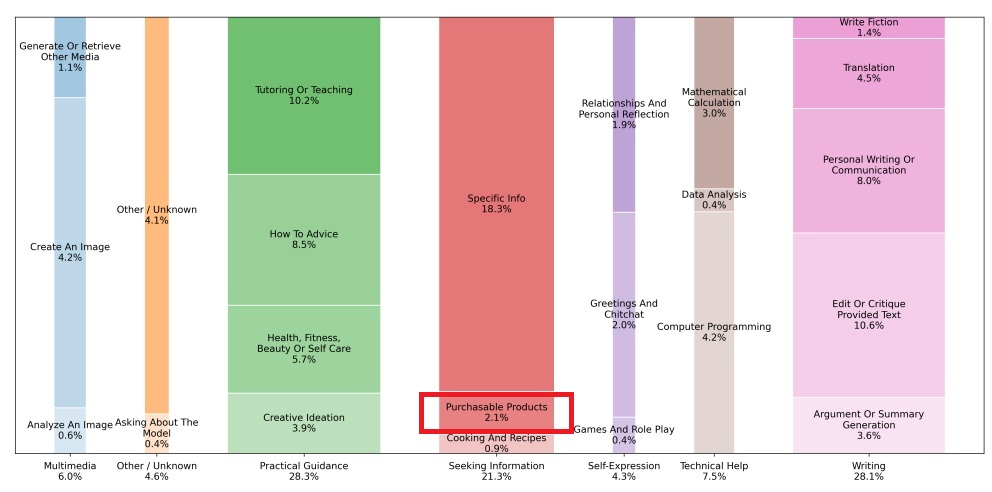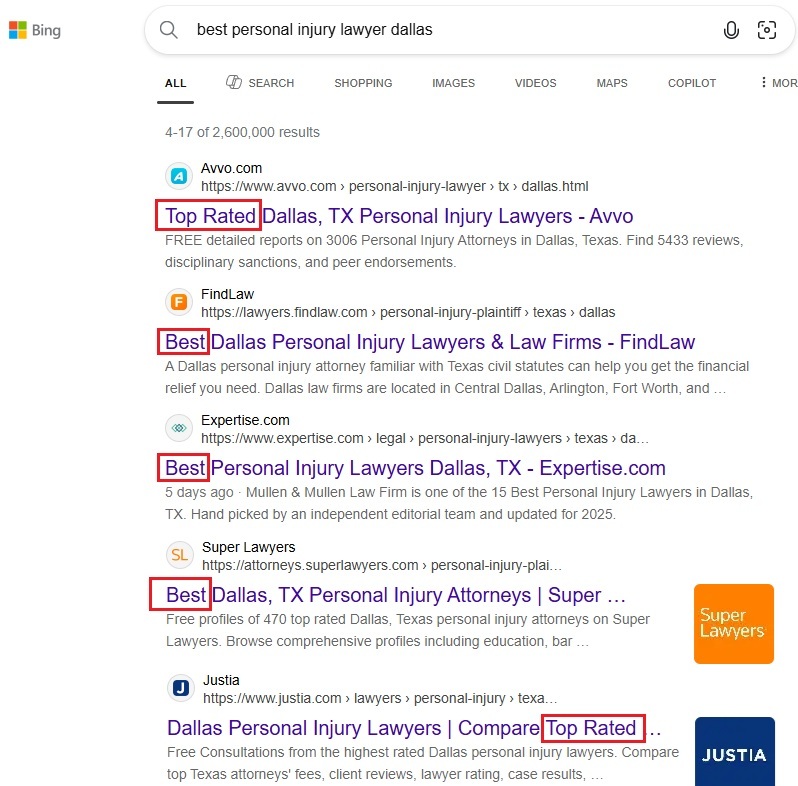In an effort to sell their “services”, several marketers are using scare tactics to tell lawyers and other local business owners they need to do something new to rank in ChatGPT.
This article will cover if people are actually searching for attorneys in ChatGPT or not, along with actionable advice.
Informational vs Transactional Search Queries:
First, let’s clear up informational vs transactional searches.
- Informational search queries: An informational search query is a user request to find facts or data, such as the answer to a legal question. Example: “What is the statute of limitations for a personal injury in Kentucky?”
- Transactional search queries: A transactional search query occurs when a user is ready to make a purchase. Example “Pizza Delivery Near Me” or “Best Personal Injury Attorney Near Me”.
It’s important to differentiate these two types of searches because many attorneys are asking “How do we rank in ChatGPT?”, and, it depends – are we talking about overall visibility, or 1 very specific transactional search?
Are People Looking for Lawyers via ChatGPT?
People are most definitely looking up legal information, laws, and liability. In April 2025, I wrote about how Google AI Overviews reduced traffic to informational search queries on law firm websites, sometimes as much as 34.5%. There’s no doubt people also use ChatGPT to look up legal information as well.
But the traffic loss is for informational search queries, not transactional. AI assistants regurgitate (summarize) content from your site to the user.
So, are people looking for attorneys on ChatGPT? As of July 2025, across all legal websites we monitor, AI assistants were driving around 1% of traffic. That doesn’t sound like a lot, but it’s important to point out that this number is growing, and of course, AI Assistants are changing daily, and Google is worth trillions of dollars, so they have quite a target on their back.
On September 15, 2025, OpenAI released a blog post called How people are using ChatGPT. That blog links to a paper showing how people use ChatGPT. And, people are using it to write code, write content (yuck), for practical guidance, and more. The “Purchasable Products” section comes in at only 2.1% of ChatGPT usage. “Purchasable Products” being inquires about products and services.

The vast majority of “Purchasable Products” queries are likely people looking for advice such as “a good laptop under $1000” (this is actually one of ChatGPT’s examples).
People just aren’t using ChatGPT to search for coffee, pizza, plumbers, or attorneys. Yet..
I’m not saying it doesn’t happen. In fact, people have found Optimize My Firm via ChatGPT, and we can see in Intaker chat logs (on legal sites with great ChatGPT visibility) the ChatGPT referral traffic. But, the sky is not falling.
Actionable Advice for Informational Queries:
If you still want to show up in ChatGPT, you must determine if you’d like to show up for informational or transactional searches, or both.
For informational searches, you need a high ranking website with lots of unique content. For most of our clients, there’s absolutely nothing new to do.
Actionable advice:
- Create original webpage content. When creating a new page about bicycle accidents, write about a specific case you’ve recently won. Add photos of the bike lanes in your city. You need very unique content for AI assistants to reference.
- AI assistants are multimodal, meaning they can pull content from your reviews, your podcasts, your text content, and your videos.
- Create long videos.
- Create short videos, get the videos onto as many platforms as possible. If you shoot <60 sec short, vertical videos, they need to be on TikTok, Instagram, Facebook, LinkedIn, and YouTube Shorts.
Actionable Advice for Transactional Queries:
This is probably what most people reading this came here for. I get it. And while I’ve downplayed ChatGPT searches, yes, there are going to be people who search ChatGPT for something such as “Who are the most reputable car accident attorneys in Louisville Kentucky?”
Note: ChatGPT Search uses Bing’s Index. ChatGPT does not use Bing’s algorithm to rank results, it uses it’s own.
1. There is no “ranking”, it’s “visibility”.
First, understand there is no ranking. You can observe results. But which firm shows up is going to depend on what people search for. ChatGPT users are not just searching for “attorney in XYZ city”, they’re searching for a wide variety of things, and even if you search the same thing, the answers generated on the fly change every time you perform the search. So, unlike Google search results, the ChatGPT response changes each time someone searches, and which ChatGPT they’re using changes the results as well.
2. Bing Places for Business.
ChatGPT claims they do not use Bing Places for Business. However, some AI Assistants do utilize Bing Places, and, ChatGPT does look at reviews from various sources, some of the same sources Bing Places also looks at. So even if ChatGPT is not using Bing Places, it makes sense to set it up.
3. Local Prominence – “Best of” Lists:
Unfortunately, most AI Assistants look at “Best Of” lists and “Top Lawyer” directories, even though they’re pay to play. The AI sees this and foolishly thinks “oh, these are the best lawyers”.

ChatGPT specifically utilizes “best of” lists. ChatGPT calls this “Local Prominence” and uses this to determine how well known an attorney or law firm is known in their city.
Here are some of the websites which influence ChatGPT visibility for law firms:
- superlawyers.com
- Yelp
- threebestrated.com
- AVVO
- FindLaw
- Justia
- Martindale
- Expertise
- Thumbtack
In my limited experience, ChatGPT appeared to cite Super Lawyers, Three Best Rated, and Yelp the most often, but it’s important to note that they look at all of these behind the scenes.
4. Peer & Client Reviews.
ChatGPT looks at reviews from multiple sites, and takes in reviews from peers into account.
Some of the sites they look at include:
- Super Lawyers
- Martindale-Hubbell AV
- Yelp
- Justia
5. Experience.
ChatGPT looks at your website and other sources to determine:
- Years in practice
- Number of cases handled
6. Verdicts & Settlements.
ChatGPT looks at past recoveries posted on your website, and other notable cases posted in other places on the web.
7. BBB:
ChatGPT claims they look at BBB for accreditation, rating, complaints, and years in business.
8. Facebook:
ChatGPT looks at Facebook for reviews, likes, recommendation ratings as well.
9. Review Recency.
Not only does ChatGPT look at Google, BBB, Facebook, Yelp, Super Lawyers reviews, they’re also looking for review recency.
10. Reddit.
ChatGPT doesn’t love reddit as much as Google does lately, but getting mentioned on reddit is helpful as well.
Recap:
The sky is not falling but it makes sense to prepare for the future. While Google and Google AI Mode are likely to dominate for the foreseeable future, a handful of people will indeed use Copilot, ChatGPT, Perplexity, Grok, Alexa, etc to search for local businesses.
To ensure you display in local searches for an attorney, I’d start by:
- Making sure your website lists your recent verdicts and settlements
- Begin obtaining reviews on multiple platforms
- Sign up for a few “best of” lists
For the attorney who wants maximum visibility, you’ll also want BBB, more “best of” list placement, possibly additional PR in local news, brand recognition, mentions in local publications, and user feedback on as many platforms as possible. If users can advocate for you on reddit, Instagram and Tiktok, even better.
